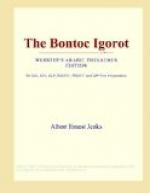An illustration of some of the differences between groups of typical Igorot will make this clearer. I select as examples the people of Bontoc and the adjoining Quiangan district in northern Nueva Vizcaya Province, both of whom are commonly known as Igorot. It must be noted that the people of both areas are practically unmodified by modern culture and both are constant head-hunters. With scarcely one exception Bontoc pueblos are single clusters of buildings; in Banawi pueblo of the Quiangan area there are eleven separate groups of dwellings, each group situated on a prominence which may be easily protected by the inhabitants against an enemy below them; and other Quiangan pueblos are similarly built. As will be brought out in succeeding chapters, the social and political institutions of the two peoples differ widely. In Bontoc the head weapon is a battle-ax, in Quiangan it is a long knife. Most of the head-hunting practices of the two peoples are different, especially as to the disposition of the skulls of the victims. Bontoc men wear their hair long, and have developed a small pocket-hat to confine the hair and contain small objects carried about; the men of Quiangan wear their hair short, have nothing whatever of the nature of the pocket-hat, but have developed a unique hand bag which is used as a pocket. In the Quiangan area a highly conventionalized wood-carving art has developed — beautiful eating spoons with figures of men and women carved on the handles and food bowls cut in animal figures are everywhere found; while in Bontoc only the most crude and artless wood carving is made. In language there is such a difference that Bontoc men who accompanied me into the northern part of the large Quiangan area, only a long day from Bontoc pueblo, could not converse with Quiangan men, even about such common things as travelers in a strange territory need to learn.
It is because of the many differences in cultural expressions between even small and neighboring communities of the primitive people of the Philippine Archipelago that I wish to be understood in this paper as speaking of the one group — the Bontoc Igorot culture group; a group however, in every essential typical of the numerous Igorot peoples of the mountains of northern Luzon.




